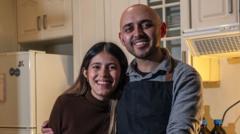It all began as a passion project for 28-year-old Fabriccio Díaz and his wife, 25-year-old Lucía Ramírez. Now, they operate Arca Film Lab—the only fully functioning photo film development facility in Central America—serving over 60 clients monthly and expertly processing more than 800 film rolls since the year's start. The lab specializes in developing all types of analogue photography film, including the complex E-6 process, vital for creating vibrant color positives.
Fabriccio, a cinematography graduate, was inspired to learn film development due to the lack of quality services in the region. "When we started experimenting in our apartment, friends began requesting our aid in developing their films, rapidly propelling us into this endeavor," Lucía reminisces. Launched in September 2023, their initiative started with a simple Instagram page offering services in Guatemala.
The couple learned their film development skills primarily via YouTube and insights from other international film labs. "We were surprised at how responsive the film community was. Many seasoned professionals generously shared their wisdom with us," Fabriccio notes. Their passion extends beyond film development, as they also lead "photo walks" in Antigua, inviting others to reconnect with photography in an analogue setting.
For many young photo enthusiasts like 22-year-old Iván Ortiz, using cameras older than themselves evokes a sense of nostalgia for a bygone generation. "In a rapidly digital world, analogue photography demands thoughtful engagement, allowing me to leave with tangible memories, not mere data files," he explains. His sentiments are echoed by 33-year-old Steven López, who documents Mayan culture across Central America, finding analogue photography the most authentic way to capture experiences.
However, this burgeoning analogue photography community grapples with significant challenges, particularly regarding accessing cameras and necessary development supplies. "Finding well-maintained analogue cameras here can be incredibly difficult," mentions 26-year-old Ronald Ottoniel during a photo walk. The couple also faces hurdles importing chemicals used for positive film development, as local regulations impose strict monitoring.
Despite their expanding business, Fabriccio and Lucía are committed to maintaining a personal touch. Lucía shares that clients sometimes include sweet treats in their film packages, to which they respond with handwritten notes. "It's vital to us that this remains a personal, rather than a mass production, endeavor," she adds.
While most commercial labs utilize automated machinery, Fabriccio and Lucía engage in a hands-on approach. With precision critical in the E-6 process, they recounted the initial anxiety they faced when developing their first positive films: "After over 800 rolls, this process now feels second nature, but the excitement never wanes," he reveals.
Their process involves moving developed rolls from the kitchen to the bathroom—their designated dust-free drying area—before scanning them with Central America's top-resolution film scanner. Expanding their reach, the couple collects and sells film rolls in El Salvador.
Looking to the future, Fabriccio dreams of collaborating with major brands like CineStill and Eastman Kodak to revive classical cinematography in Central America. "Our talent, expertise, and excitement can enrich the world of film. With Arca Film Lab, we're igniting a movement, and we aim to push it further," he declares passionately.









